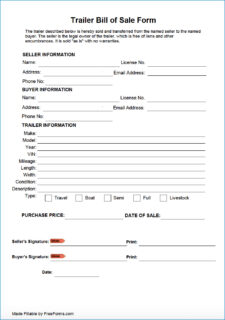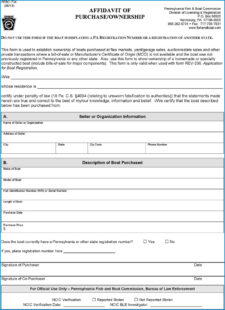
A trailer bill of sale is a legal document used to transfer ownership of a trailer from one party to another. It serves as proof of the transaction and outlines the details of the sale, including the purchase price, buyer and seller information, and any warranties or guarantees. This document is essential for both the buyer and the seller to protect their rights and ensure a smooth transfer of ownership.
So, why do you need a trailer bill of sale? Here are a few reasons:
1. Legal Protection
Having a trailer bill of sale provides legal protection for both the buyer and the seller. It establishes a clear record of the transaction and can be used as evidence in case of any disputes or claims in the future. It helps protect the buyer against any hidden liabilities or outstanding debts associated with the trailer, while also protecting the seller from any future claims or liabilities.
2. Transfer of Ownership
A trailer bill of sale is necessary to transfer ownership of the trailer from the seller to the buyer. Without this document, the buyer may have difficulty proving their ownership and may encounter problems when trying to register the trailer or obtain insurance. It also ensures that the seller is no longer responsible for any accidents or damages that may occur after the sale.
3. Proof of Purchase
A trailer bill of sale serves as proof of purchase, which is important for both the buyer and the seller. It provides a paper trail and can be used to establish the purchase price, date of sale, and other relevant details. This proof of purchase can be helpful for tax purposes, insurance claims, and future sales or transfers of the trailer.
4. Warranty or Guarantee Information
If the trailer being sold comes with any warranties or guarantees, these details should be included in the bill of sale. This ensures that both parties are aware of any warranties or guarantees that may apply to the trailer and can help resolve any issues that arise during the warranty period. Including this information in the bill of sale provides clarity and transparency.
5. Compliance with State Laws
Many states require a bill of sale for the transfer of certain types of trailers. By having a trailer bill of sale, you can ensure compliance with your state’s laws and regulations. Failing to provide the necessary documentation may result in penalties or legal complications.
When Do You Need a Trailer Bill of Sale?
Now that you understand why a trailer bill of sale is important, let’s discuss when you might need one. Here are a few scenarios:
1. Selling or Buying a Used Trailer
Whether you are selling or buying a used trailer, a bill of sale is essential. It protects both parties and ensures a smooth transfer of ownership. If you are the seller, you can provide the bill of sale to the buyer as proof of the transaction. If you are the buyer, you can request a bill of sale from the seller to protect your rights and establish your ownership.
2. Transferring Ownership within a Family
If you are transferring ownership of a trailer within your family, it is still important to have a bill of sale. This document helps establish the transfer of ownership and protects both parties, even if the transaction is between family members.
3. Registering the Trailer
When registering a trailer, many states require a bill of sale as part of the registration process. Without this document, you may not be able to register the trailer in your name or obtain the necessary license plates. It is important to check your state’s requirements and ensure you have all the necessary documentation before attempting to register the trailer.
What to Include in a Trailer Bill of Sale
When writing a trailer bill of sale, several key elements should be included. These include:
- Buyer and Seller Information: Include the full legal names and contact information of both the buyer and the seller.
- Trailer Description: Provide a detailed description of the trailer, including the make, model, year, VIN (Vehicle Identification Number), and any other identifying information.
- Purchase Price: Clearly state the agreed-upon purchase price for the trailer.
- Date of Sale: Include the date when the sale is taking place.
- Payment Terms: Specify the payment terms, such as whether it is a cash sale or if any financing is involved.
- Warranties or Guarantees: If there are any warranties or guarantees associated with the trailer, include the details in the bill of sale.
- Signatures: Both the buyer and the seller should sign the bill of sale to make it legally binding.
It is important to be as detailed and specific as possible when writing a trailer bill of sale. This helps avoid any confusion or misunderstandings between the buyer and the seller.
How to Write a Trailer Bill of Sale
Writing a trailer bill of sale may seem daunting, but it is a straightforward process. Here are the steps to follow:
- Gather Information: Collect all the necessary information, including buyer and seller details, trailer description, purchase price, and any warranties or guarantees.
- Use a Template: Find a trailer bill of sale template online or create your own. Make sure it includes all the required elements mentioned earlier.
- Fill in the Details: Enter the information gathered in Step 1 into the appropriate sections of the template.
- Review and Edit: Double-check the document for accuracy and make any necessary edits or revisions.
- Print and Sign: Print out the completed bill of sale and have both the buyer and the seller sign it in the presence of a witness if required by your state’s laws.
- Keep Copies: Make copies of the signed bill of sale for both the buyer and the seller to keep for their records.
By following these steps, you can easily create a valid and legally binding trailer bill of sale.
Mistakes to Avoid When Writing a Trailer Bill of Sale
While writing a trailer bill of sale, it is important to avoid certain common mistakes. Here are a few to watch out for:
- Missing Information: Ensure that all the necessary details, such as buyer and seller information, trailer description, and purchase price, are included in the bill of sale.
- Unclear Language: Use clear and concise language to avoid any confusion or misunderstandings. Avoid using technical jargon or complex terms.
- Failure to Include Warranties or Guarantees: If there are any warranties or guarantees associated with the trailer, make sure to include them in the bill of sale.
- Not Getting Signatures: Both the buyer and the seller should sign the bill of sale to make it legally binding. Failure to obtain signatures may render the document invalid.
- Not Keeping Copies: Make sure to make copies of the signed bill of sale for both the buyer and the seller to keep for their records.
By avoiding these mistakes, you can ensure that your trailer bill of sale is accurate, complete, and legally binding.
Download: Trailer Bill of Sale Template







